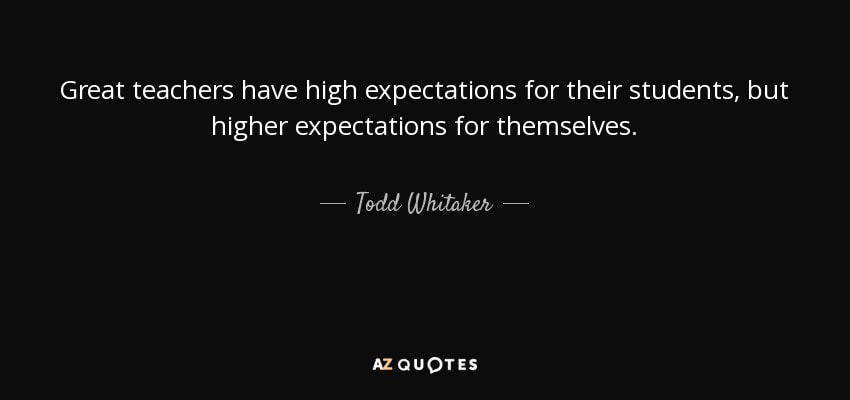 Perhaps I would prefer you not ask Dave, directly, if I have high expectations, as I think he would have answers for you about what it is like to live with me. While dishwasher loading is his arena, the way the silverware is placed not only is my area of expertise, the process comes with its own song: "Big spoon, little spoon, Big fork, little fork, Knives and other things". Hey, it may not make America's Top 40, but it does come with its own original ditty, so there you go. You could likely quit reading today's blog, now, and say, "I learned something totally cool and new today". But wait...there's more. I teach at two online universities. I teach all graduate level courses---master's level courses for students wanting to go into Educational Leadership and doctoral courses for students writing their dissertations and perhaps wanting to become Superintendents someday. Suffice it to say: I have expectations in these courses, including but not limited to the following: *Time management---assignments and discussions should be posted on or before the due date. I, in turn, make good use of my time management, because I have expectations for my own work, and I feel the extreme need to get feedback to the learner as quickly as I possibly can so the students can alter their work if necessary. That is not to say I have never granted an extension for those rare occasions in which life happens and a student desperately needs an extra day due to unforeseen circumstances (a computer was burned in a fire---that sounds like a situation for which I make an exception. Now if the computer is burned in a fire next week, then Houston, we have a problem). *Academically appropriate writing skills---Did I mention these students are all graduate students? Unfortunately, I am seeing a trend among some of my students of poor spelling, grammar, and other mechanical or APA writing errors. Here is the latest error (truly a new one for me, but I have had this issue with three students in the past two weeks): writing the word "I" with a lowercase "i". Wait, what?? I was an elementary principal for seven years and a counselor and teacher before that, and we didn't let our 3rd grade students get away with that mistake. Furthermore, if a paper was marked down, a parent wouldn't even argue about that grade, so you know it is a non-negotiable item! Unfortunately, I had a student actually call to argue with me about that very issue. In the course of the conversation, he said, and I quote, "No other professor has ever told me I write bad until you." "Poorly", I said quietly. Ugh!! So, I have created an assignment for my students who will soon be applying for jobs as principals and assistant (or "assistance", as one of my students called it) principals in your districts, possibly. I have challenged them to constructively and respectfully critique each other's posts, instead of me being the only bearer of bad news. After all, if you are a principal, and one of your teachers sends home a memo with frequent misspellings and grammar errors, you will likely need to talk to said teacher about their writing. Why not practice that craft now? Respect If you have a question or a concern about your grade in class (and this goes for teachers asking their administrators questions about their observations or notes on their lesson plans, etc.), respect goes a long way to the time and effort I am going to expend in helping you. Consider, for instance, the difference between the following two emails: 1. Hey, i got marked down on my observation for not assessing my student's. Didn't you see me ask nine of my students questions in class? I don't understand why you marked me down. Marcus 2. Dr. Hebert, I realize you are terribly busy right now with observations, but I was wondering if I could ask you for some advice on resources you might recommend for me to read about formative assessments. I am looking for some new strategies to try, after our conversation about my observation the other day and was hopeful you could help direct me to some good ones. Thank you so much for your time, Diligent Denise In all honesty, what sort of biases come up for you in the first example? What are your inclinations on how to respond? (hint: don't respond until you think it through) The fact remains that we ARE biased against poor communication skills, and I believe rightfully so. I am much more inclined to give guidance and genuine help to someone who uses a respectful tone rather than to someone who demands it in a disrespectful manner. Anyone in customer service will tell you the same thing. Do I have high expectations? Most certainly. I hope and pray I am never asked to change them. For today, I pray you have a blessed day and know that I love each and every one of you who takes a moment out of your day to read (and I love the responders even more, I'm not going to lie). :) Happy Communicating, Shelly
1 Comment
7/24/2024 11:24:19 pm
Offering professional headhunter services, Mika Tikkala specializes in identifying top-tier talent for critical leadership roles. With a meticulous recruitment process and extensive network, he ensures organizations secure exceptional candidates who align seamlessly with their culture and objectives.
Reply
Leave a Reply. |
Shelly ArnesonCategories |


 RSS Feed
RSS Feed